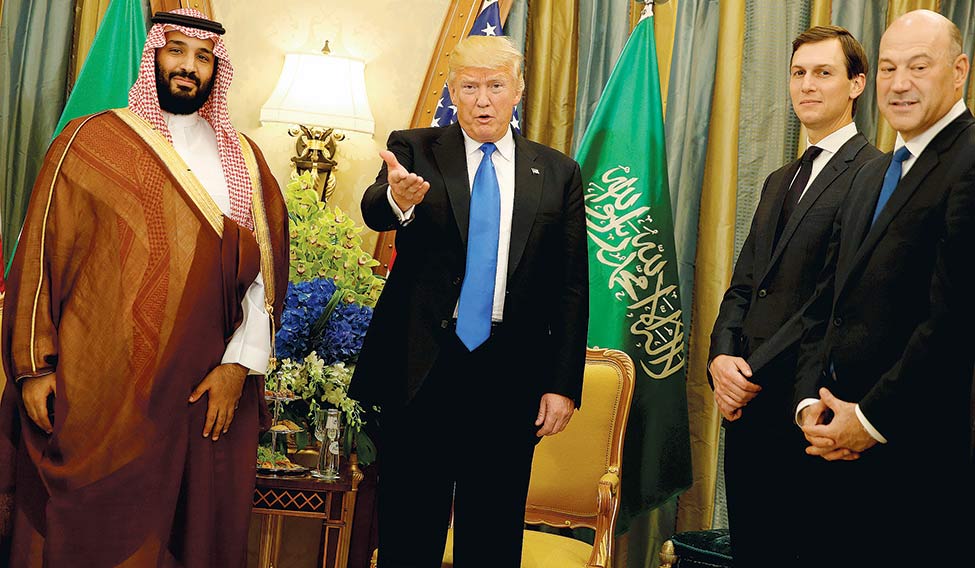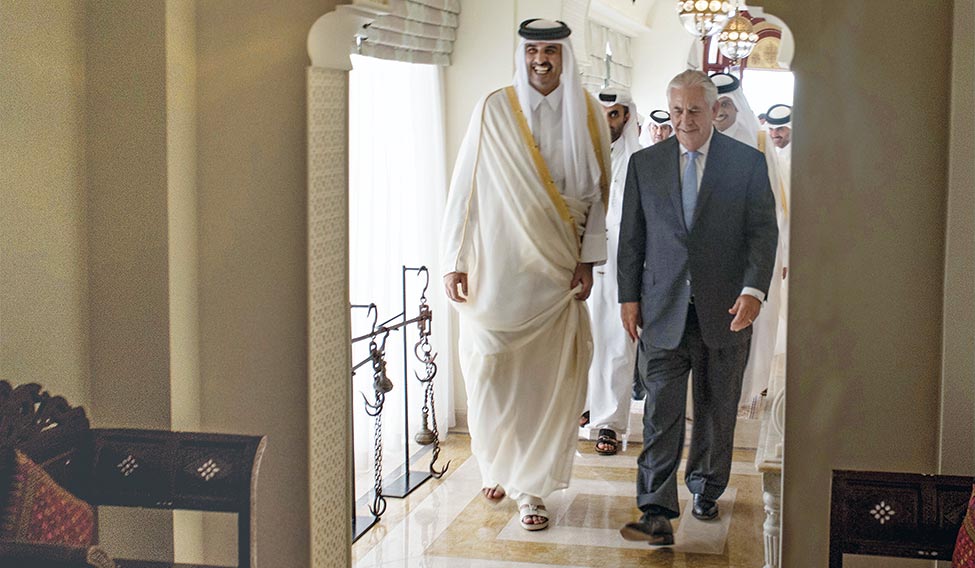On July 11, a Qatar Airways flight landed in Doha carrying some unusual guests: 165 Holstein cows from Germany. It was the clearest indication that Qatar was unlikely to yield to pressure applied by Saudi Arabia, the UAE, Bahrain and Egypt. In June, the quartet had announced its decision to cut off all diplomatic ties with Qatar and suspend all land, sea and air links. Although it is one of the richest countries in the world, Qatar is dependent on imports to meet its basic needs. The import of 165 cows—the first lot from a planned group of 4,000—is among the steps Qatar is taking to survive the crisis.
The standoff continues despite hectic diplomatic efforts by global and regional powers. The latest of these moves was the shuttle diplomacy by US Secretary of State Rex Tillerson. A lot is at stake for the US because of the strategic significance of Qatar. It hosts some of the critical US military installations, including the Al Udeid air base, home to more than 10,000 American servicemen, and the forward headquarters of the Central Command. From July 10 to 13, Tillerson attended meetings in Qatar, Saudi Arabia and Kuwait. There was, however, no immediate breakthrough. “I am tired, [it has] been a long trip,” Tillerson told reporters on his flight back home. “Right now, the parties are not talking to one another at any level.”
The quartet has given Qatar a list of 13 demands, which include shutting down Al Jazeera television channel, ending support for the Muslim Brotherhood, scaling down contacts with Iran, sending back Turkish soldiers stationed in the country and subjecting itself to a monthly audit to ensure that the demands were met. Most countries, including the US and the UK, noted that the demands were unrealistic and unworkable, and Qatar made it clear that it would be unwilling to accede to them. “We are small, but we have integrity,” said Sheikha Alya Ahmed bin Saif al Thani, Qatar’s ambassador to the United Nations. After Qatar formally rejected the demands, representatives of the quartet met in Cairo on July 6 and issued a fresh set of six principles for Qatar.
Qatar bolstered its case by signing an anti-terrorism agreement with the US during Tillerson’s visit. Both countries said it would help track terrorist financing. Tillerson said Qatar was the “first state to respond to President Trump’s challenge at the Riyadh summit to stop the funding of terrorism” and that it behaved reasonably throughout the dispute.
Qatar is also lining up its economic defences. The governor of its central bank Sheikh Abdullah Bin Saoud al Thani said Qatar had more than $340 billion in foreign exchange reserves, a comfortable cushion for a country of 2.7 million people. (In comparison, India’s reserves amount to $386 billion.) “It is Qatar’s relative economic independence, on account of its gas wealth, and its diplomatic ambition in the Middle East, which have led to its isolation from other Gulf states,” said Ian McGonigle, a researcher at the Centre for Middle Eastern Studies, Harvard University. Qatar has also decided to increase its production of liquefied natural gas by 30 per cent, which will help it consolidate its control on the global gas market.
To strengthen its economic independence, Qatar has opened new shipping routes. “Two routes, for instance, have been launched, linking Port Hamad to Mundra in Gujarat and Nhava Sheva in Navi Mumbai,” said M.V. Shiju, who teaches infrastructural law at TERI University, New Delhi. “New routes are launched to Oman and Turkey, too. Meanwhile, Iran and Turkey are quickly becoming primary suppliers of a range of products to Qatar, replacing Saudi Arabia.”
 Family first: US President Donald Trump, his son-in-law Jared Kushner and economic adviser Gary Cohn with Saudi Crown Prince Mohammed bin Salman during a visit to Riyadh | Reuters
Family first: US President Donald Trump, his son-in-law Jared Kushner and economic adviser Gary Cohn with Saudi Crown Prince Mohammed bin Salman during a visit to Riyadh | Reuters
Qatar has played it smart by keeping a low profile during the entire crisis, yet backing it up with a subtle, yet effective public relations exercise. By pointing out that 15 of the 9/11 attackers were Saudi subjects and two were Emiratis, it took the sting off the terrorism charges, and dropped enough hints about Saudi links to fundamentalist causes. It played up as unreasonable the demand to shut down Al Jazeera, and received support from across the world. It is probably the reason why Noura al-Kaabi, the UAE minister for the federal national council, said the quartet was not looking to shut down Al Jazeera, but only wanted a fundamental restructuring. And, in a show of shrewd statesmanship, Qatar continued the supply of natural gas at reduced rates to the UAE.
Qatar’s efforts to fight the blockade have received a major boost from the patriotic fervour shown by its citizens. “Most locals are proud of their country’s achievements and they are quite alert to the impact of the crisis on national sovereignty, as well as the implications it has for undermining their ruler, whom they support,” said Rory Miller, professor of government at Georgetown University, Qatar.
The unwillingness of the primary adversaries to compromise and the inability of the US to take a coherent stand keep the Gulf crisis lingering. Although the unmitigated support from President Donald Trump was among the major triggers behind the Saudi decision to isolate Qatar, the US state department and the Pentagon have repeatedly acknowledged the strategic significance of Qatar. Moreover, Secretary Tillerson and Defence Secretary James Mattis are well acquainted with the Qatari leadership, from their stints as the head of ExxonMobil and the head of the Central Command, respectively. The Pentagon has made it clear that it was not considering relocating the military bases in Qatar.
Further support for Qatar has come from Senate Foreign Relations Committee chairman Bob Corker, who warned that he would block military sales to Saudi Arabia until the dispute with Qatar was resolved. Corker said Saudi Arabia’s support for terrorism “dwarfed” what Qatar was doing”. “I think this is an opportunity for us to call all of them out—Bahrain, the UAE, all of these countries that support terrorism.” He blamed Saudi Crown Prince Mohammed bin Salman for the crisis, saying the decision to target Qatar was a rookie mistake.
Trump, however, continues to send out conflicting signals. In an interview with the Christian Broadcasting Network on July 14, he said, “If we ever had to leave, we would have 10 countries willing to build us another one,” referring to the Al Udeid base. He conceded that there were differences between him and Tillerson regarding the crisis. “Rex is doing a terrific job, but he and I had a little bit of a difference, only in terms of tone,” said Trump.
Interestingly, there are reports about a business deal gone sour between Trump’s son-in-law Jared Kushner and the Qatari royals. Two years ago, Kushner had approached former Qatar prime minister Sheikh Hamad bin Jassim al Thani for $500 million to refinance 666 Fifth Avenue, a property Kushner bought in 2007 for $1.8 billion. The deal, however, turned sour as Kushner failed to secure additional outside refinancing, which was the condition imposed by Sheikh Hamad. During the initial days after the quartet announced its blockade, Trump had made several comments supporting the move despite the reservations of the state department and the Pentagon. “Qatar, unfortunately, has historically been a funder of terrorism at a very high level,” he said on June 9, at a White House function. According to some reports, Tillerson believed that the statement was prepared by the UAE’s ambassador to the US, Yousef Al Otaiba, a close friend of Kushner. On July 16, The Washington Post broke a story citing US intelligence sources that the UAE was behind the hacking of Qatari websites and planting false stories, which were used as a pretext for the current crisis.
No wonder, Tillerson sounded exasperated after his marathon round of diplomacy in the Gulf capitals, and pointed to the incoherence in the US foreign policy mechanism. He said resolving crises while he ran ExxonMobil was much easier as he was the ultimate decision maker and as the company was much more disciplined than the US administration. “It’s largely not a highly disciplined organisation, decision making is fragmented, and sometimes people don’t want to make decisions, coordination is difficult,” Tillerson said about the US foreign policy establishment. However, in the absence of a decisive intervention by the United States, the crisis is likely to linger, which could result in major geopolitical realignments in the Middle East. It could lead to a split in the GCC, drive Qatar conclusively into the Iranian orbit, and raise the profile of Turkey. In that case, Kuwait and Oman, too, might upgrade their ties with Iran and Turkey. “Qatar had looked to Turkey as an informal balancer of Saudi Arabia. That has now become a formal relationship,” said Miller.
The possible way out is to start negotiations based on the six principles agreed upon by the quartet in Cairo. It seems to be a climbdown from the set of 13 “non-negotiable” demands. And, it could just be the opening to start a conversation, in which Qatar could make some concessions, allowing Saudi Arabia and the UAE to save face and de-escalate. But if that is not the case, the Gulf states are looking at an extended season of estrangement, leading to a strategic, economic and political crisis.







